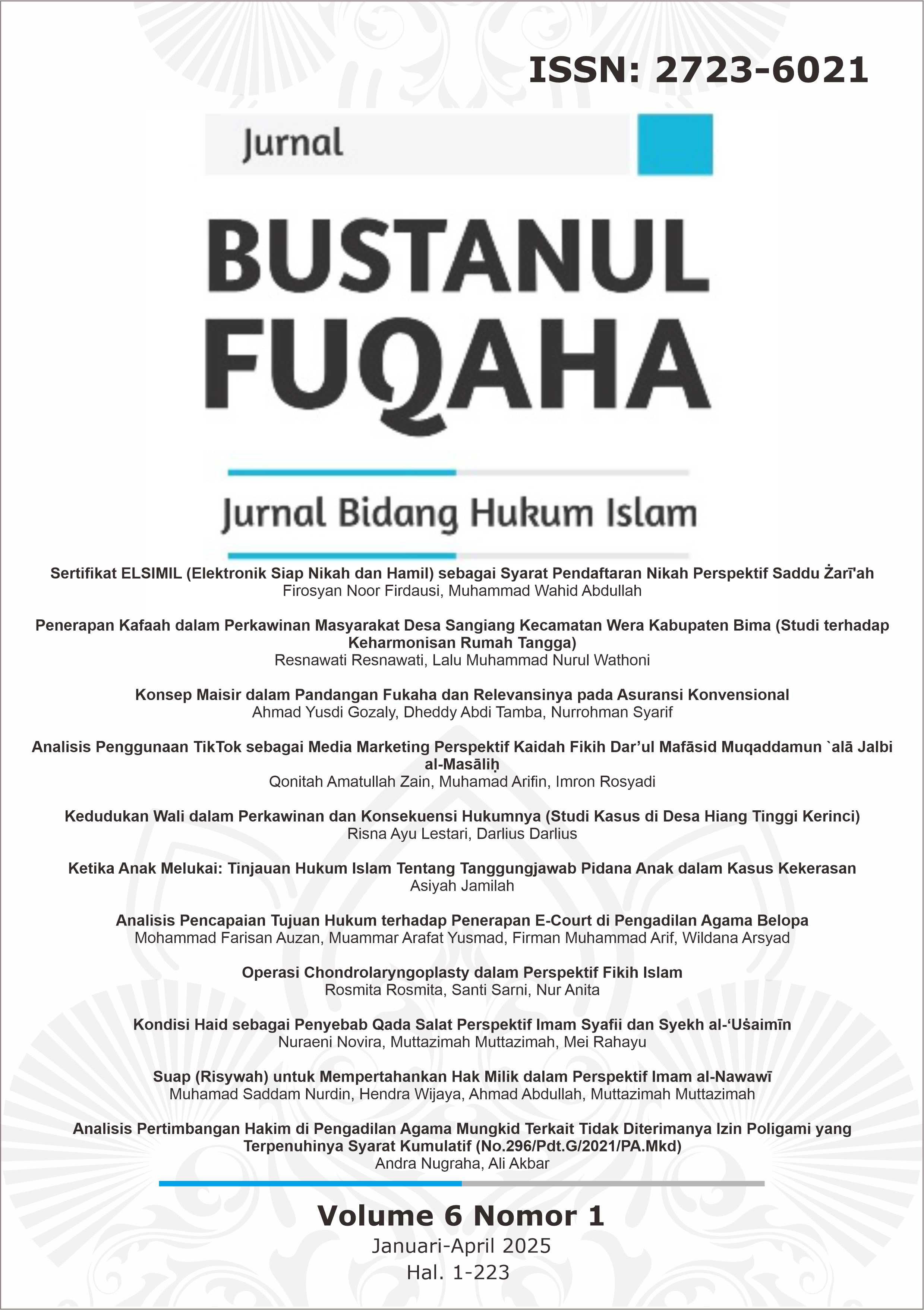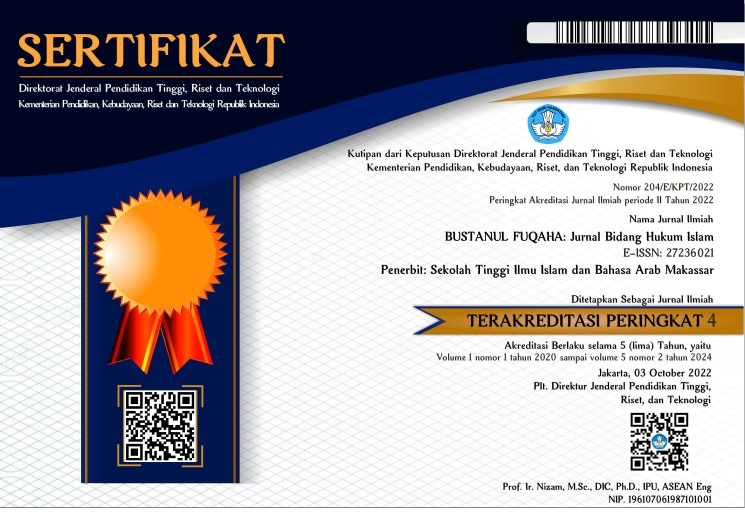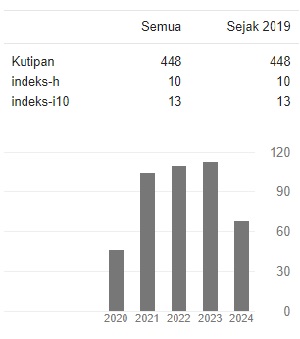Kondisi Haid sebagai Penyebab Qada Salat Perspektif Imam Syafii dan Syekh al-‘Uṡaimīn
The Condition of Menstruation as a Cause for Qada Prayer: The Perspectives of Imam Shafi'i and al-‘Uṡaimīn
DOI:
https://doi.org/10.36701/bustanul.v6i1.2053Keywords:
menstruation conditions, making up prayers, perspective, imam Shafi'i, sheikh al-‘UṡaimīnAbstract
In Islam, menstruating women are not obligated to perform prayers (ṣalāh) and are not required to make them up. However, if menstrual blood appears unknowingly when the prayer time has arrived, scholars have differing opinions regarding the obligation of performing the prayer in such a condition. This study aims to examine the views of Imam Shafi'i and Sheikh al-‘Uthaymeen regarding menstruation conditions that necessitate a woman to make up her missed prayers, as well as to identify the similarities and differences in their opinions. The research employs a qualitative descriptive approach (non-statistical), focusing on textual and scriptural studies, using normative, historical, and comparative methods. The findings of this research indicate that a menstruating woman is required to make up her missed prayer if she attains purity at the end of the prayer time and has enough time to perform at least one rak‘ah before the time expires. In this case, she must perform the prayer after taking a ritual bath (ghusl). Additionally, if menstruation begins after the prayer time has entered, but she has not yet prayed, she must make it up after attaining purity. This opinion is held by both Imam Shafi'i and Sheikh al-‘Uthaymeen.Another condition discussed is when a woman attains purity during the time of ‘Asr prayer; according to Imam Shafi'i, she is required to combine it with the Dhuhr prayer. Likewise, if she becomes pure during the time of ‘Isha prayer, she must also perform the Maghrib prayer. However, Sheikh al-‘Uthaymeen disagrees with this view and holds that she is only required to perform ‘Asr or ‘Isha without having to combine it with the preceding prayer.Furthermore, if a woman has attained purity but intentionally delays taking the ritual bath until the prayer time expires, Imam Shafi'i mandates her to make up the missed prayer, whereas Sheikh al-‘Uthaymeen does not obligate her to do so. Instead, he advises her to repent frequently and engage in righteous deeds.
Downloads
References
Al-Buhūtī, Manṣūr bin Yūnus al-Ḥanbalī. Kasysyāf al-Qinā’ ‘an al-Iqnā.’ Cet. I. Juz 2. Saudi Arabia: Wazārah al-‘Adl, 1421.
Al-Bukhārī, Abu ‘Abdillāh Muḥammad bin Ismā’īl al-Ja’fī. Al-Jāmi’ al-Musnad al-Ṣaḥīḥ al-Mukhtaṣar min Umūr Rasūlillah wa Sunanuh wa Ayyāmuh. Cet. V. Damasyqa: Dār Ibn Kaṡīr, 1414.
Al-Harirī, Muḥammad al-Amīn. Al-Kaukab al-Wahhāj Syarḥ Ṣaḥīḥ Muslim bin Ḥajjāj. Cet. I. Makkah al-Mukarramah: Dār al-Minhāj, 1430.
Al-Kūfī, Abu Bakr ‘Abdullah bin Abī Syaibah. Al-Muṣannif. Juz 5. Cet. I. Riyad: Dār Kanūz Isybīlyā li al-Nasyr wa al-Tauzī’, 1436.
Al-Nawawī, Abu Zakariyā Muḥyī al-Dīn. Al-Majmū’ Syarḥ al-Muhażżab. Cet. I. Juz 3. Kairo: Idārah al-Ṭabā’ah al-Munīriyah, 1344.
———. Al-Majmū’ Syarḥ al-Muhażżab. Juz 4. Cet. I. Kairo: Idārah al-Ṭabā’ah al-Munīriyah, 1344.
———. Al-Majmū’ Syarḥ al-Muhażżab. Juz 2. Cet. I. Kairo: Idārah al-Ṭabā’ah al-Munīriyah, 1344.
———. Al-Minhāj Syarḥ Ṣaḥīḥ Muslim. Cet. II. Juz 5. Beirut: Dār Iḥyā’ al-Turāṡ al-‘Arabī, 1392.
Al-Nisābūrī, Abu al-Ḥusain Muslim. Ṣaḥīḥ Muslim. Cet. I. Kairo: Maṭba’ah ‘Īsā al-Bābī al-Ḥalabī, 1374.
———. Ṣaḥīḥ Muslim. Juz 2. Cet. I. Kairo: Maṭba’ah ‘Īsā al-Bābī al-Ḥalabī, 1374.
Al-Tirmiżī, Muḥammad bin ‘Īsā. Sunan al-Tirmiżī. Cet. II. Mesir: Syirkah Maktabah wa Maṭba‘ah Muṣṭafā al-Bābī al-Ḥalabī, 1395.
Al-‘Uṡaimīn, Muḥammad bin Ṣāliḥ. Fatāwā Nūr ‘alā al-Darb. Cet. I. Juz 8. al-Riyāḍ: Maktabah al-Mulk Fahd al-Waṭaniyah, 1434.
———. Majmū’ Fatāwā wa Rasāil Faḍīlah al-Syaikh. Juz 12. Dār al-Waṭan, 1413.
———. Sittūn Suāl wa Jawāb fī Aḥkām al-Ḥaiḍ. Dār al-Qimmah, t.t.
Ibnu Qudāmah, Muḥammad al-Ḥanbalī. Al-Mugnī. Juz 2. Cet. III. Riyad: Dār ‘Ᾱlam al-Kutub li al-Ṭabā’ah wa al-Nasyr wa al-Tauzī,’ 1417.
Ibnu Taimiyah, Syaikh al-Islām Ahmad. Majmū’ al-Fatāwā. Juz 19. Madīnah al-Munawwarah: Majma’ al-Malak Fahd li Ṭāba’ah al-Muṣḥaf al-Syarīf, 1425.
Kementerian Agama Republik Indonesia. Al-Qur’an Hafalan. Cet. I. Bandung: Cordoba, 2020.
Lambajo, Sartini. Menyingkap Rahasia Seputar Haid. Makassar: CV Arrahman Sukses Berkah, 1441.
Jurnal
Mohamad Ikhwan Ariff Bin Zainal Abidin, 131209708. “Hukum Mengqadha Shalat yang Terlewat dengan Sengaja.” Skripsi, UIN Ar-Raniry Banda Aceh, 2019. http://library.ar-raniry.ac.id.
Saifulloh, Kholid. “MENGQADHA SHALAT DALAM PERSPEKTIF FIQH ISLAM.” Al-Majaalis : Jurnal Dirasat Islamiyah 7, no. 2 (20 Mei 2020): 45–67. https://doi.org/10.37397/almajaalis.v7i2.139.














